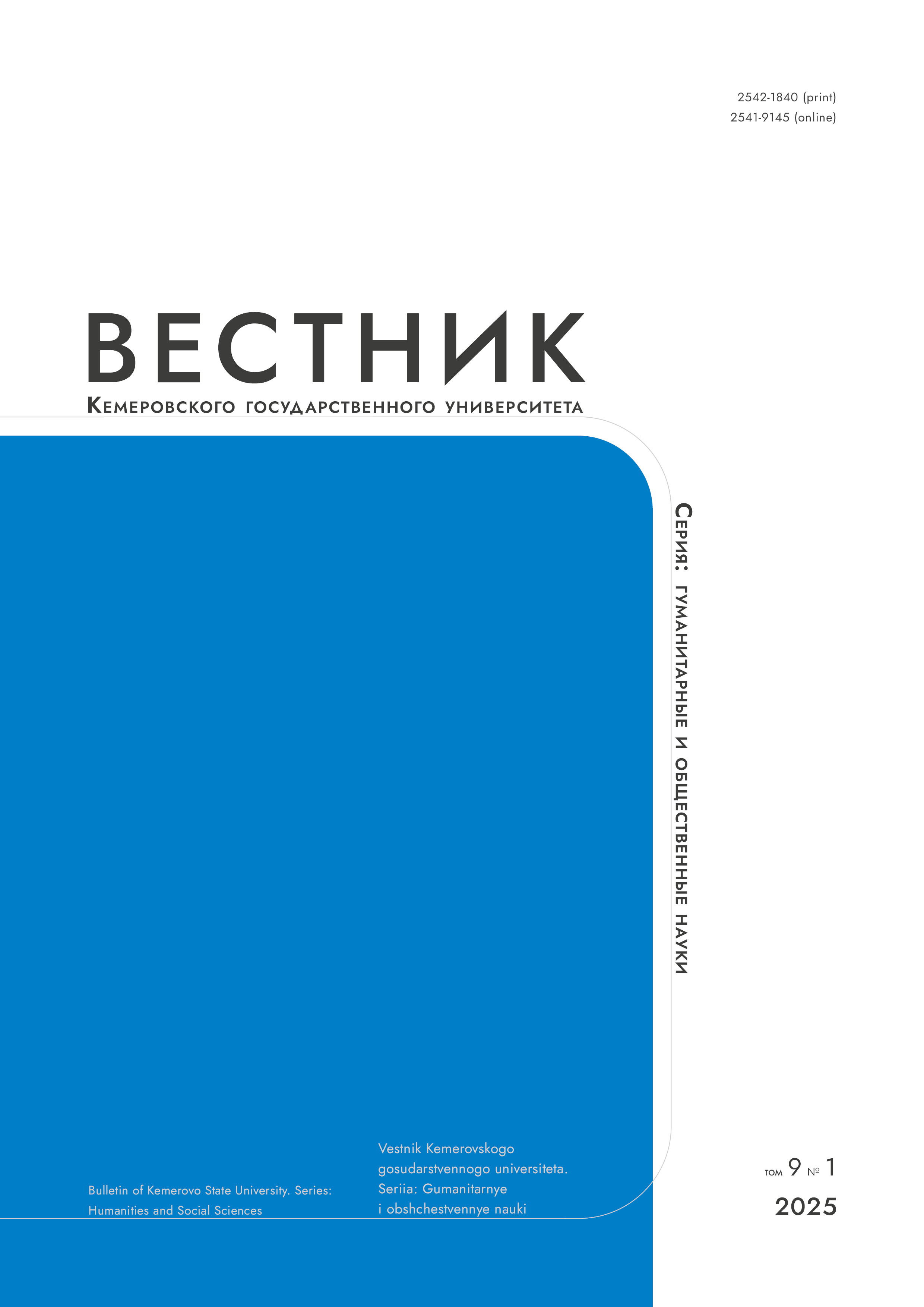Kemerovo, Russian Federation
Kemerovo, Russian Federation
The ecosystem approach develops communication skills and promotes creativity by digitalizing the academic environment. The authors analyzed the ecosystem approach from economic, philosophical, psychological, and pedagogical perspectives. They described the possibilities of using digital tools in the process of teaching a foreign language to university students of IT departments. The article introduces the basic trends in academic digitalization. Digital tools can organize the academic environment in the process of teaching a foreign language, e.g., the Miro virtual whiteboard, the Nearpod platform, the 4portfolio.ru portal, the Google Calendar service, etc. An empirical survey proved that the ecosystem approach is an efficient tool of second language acquisition, which develops creative interaction, generates innovative solutions, increases positive motivation, develops business communication skills, and provides business communication experience.
ecosystem approach, digitalization, digital tools, teaching a foreign language, business communication, productive interaction, higher education
1. Fedorov I. M. Transition from educational environment to the educational ecosystem. Molodoi uchenyi, 2019, (28): 246-249. (In Russ.) EDN: https://elibrary.ru/JFIGNX
2. Odum E. P. Basic ecology. Moscow: Mir, 1986, vol. 1, 328. (In Russ.)
3. Oleynikov B. V., Podlesny S. A. On the conception of "learning ecosystem" and development directions of education informatization. Znanie. Ponimanie. Umenie, 2013, (4): 84-91. (In Russ.) EDN: https://elibrary.ru/RSEWVH
4. Yakubovskaya E. G. "Goals 2000" as the beginning of a new stage of US educational policy (the 90s of the XX century). Actual problems of international relations in the early XXI century: Proc. 5th Sci.-Prac. Conf. of Young scientists, Moscow, 18 Apr 2022. Moscow, 2002, iss. 5, 159-167. (In Russ.)
5. Utkin A. V., Shevchenko K. V. Ecosystem approach in education: from metaphor to methodology and practice. Vestnik Cherepovetskogo gosudarstvennogo universiteta, 2022, (2): 175-189. (In Russ.) https://doi.org/10.23859/1994-0637-2022-2-107-14
6. Kremneva L. V., Zavedensky K. E., Rabinovich P. D., Apenko S. N. Strategizing education: ecosystem transition. Integratsiya obrazovaniya, 2020, 24(4): 656-677. (In Russ.) https://doi.org/10.15507/1991-9468.101.024.202004.656-677
7. Kaplan A. Lifelong learning: conclusions from a literature review. International Online Journal of Primary Education, 2016, 5(2): 43-50.
8. Rozin V. M. Ecosystem approach in education. Kultura kultury, 2021, (4). (In Russ.) URL: http://cult-cult.ru/ecosystem-approach-in-education/ (accessed 28 Oct 2022). EDN: https://elibrary.ru/PSKXYX
9. Kuklina L. V., Kuklin S. Ya. Theoretical background for the ecosystem research approach to the management of educational activities. Modern pedagogical education, 2021, (8): 27-33. (In Russ.) EDN: https://elibrary.ru/NYHTUN
10. Safuanov R. M., Lekhmus M. Yu., Kolganov E. A. Digitalization of the education system. Vestnik UGNTU. Nauka, obrazovanie, ekonomika. Seriia: Ekonomika, 2019, (2): 116-121. (In Russ.) https://doi.org/10.17122/2541-8904-2019-2-28-108-113
11. Lutsein M. V. Digitalization of education: concept, technologies, and implementation. Relevant issues of the contemporary education development: Proc. Symposium within the framework of the XVI (XLVIII) Intern. Sci. Conf. of Students, Postgraduates and Young Scientists, Kemerovo, 1-30 Apr 2021. Kemerovo: KemSU, 2021, iss. 22, 27-31. (In Russ.) EDN: https://elibrary.ru/YCGGIC
12. Kolomiets S. V., Medvedeva E. V., Perevalova A. A. Innovation in teaching multicultural future specialists in Kuzbass coal mining region: a flipped classroom approach. E3s Web of Conferences: Proc. 5th Intern. Innovative Mining Symposium, IIMS 2020, Kemerovo, 19-21 Oct 2020. EDP Sciences, 2020, vol. 174. https://doi.org/10.1051/e3sconf/202017404026
13. Knyazeva S. Yu., Kapelyushnik D. M., Pushkareva E. N. Digital tools and applications for teachers. Pedagogika informatiki, 2020, (3). (In Russ.) URL: http://pcs.bsu.by/2020_3/1ru.pdf (accessed 28 Oct 2022). EDN: https://elibrary.ru/BSLNET
14. Kalimullina O. V., Trotsenko I. V. Modern digital educational tools and digital competence: analysis of cases and trends. Open Education, 2018, 22(3): 61-73. (In Russ.) https://doi.org/10.21686/1818-4243-2018-3-61-73
15. Shaykhutdinova L. M. Digital tools of the teacher for the organization of distance learning. Skif. Voprosy studencheskoi nauki, 2021, (5): 512-516. (In Russ.) EDN: https://elibrary.ru/AMZFKR
16. Astapenko E. V., Bedareva A. V. Didactic capabilities of the Miro virtual whiteboard and the Wordwall educational resource for organizing students' work in the foreign language learning process at university. Russian Journal of Education and Psychology, 2021, 12(1): 7-24. (In Russ.) https://doi.org/10.12731/2658-4034-2021-12-1-7-24
17. Gorovenko L. A., Aleksanyan G. A. An analysis of didactic opportunities of using RealTimeBoard virtual whiteboard tools in the educational process. The Bulletin of the Adyghe State University. Ser.: Natural-Mathematical and Technical Sciences, 2019, (2): 47-53. (In Russ.) EDN: https://elibrary.ru/DWEOIL
18. Perevalova A. A. Possibilities of information and communication technologies as a subject of pedagogical interaction. Sovremennye problemy nauki i obrazovaniia, 2020, (5). (In Russ.)) https://doi.org/10.17513/spno.30098
19. Mashevskaya O. V. Digital technology as the foundation of digital transformation. Bulletin of Polessky State University. Series in Social Sciences and Humanities, 2020, (1): 37-44. (In Russ.) EDN: https://elibrary.ru/LECURE
20. Kurbatsky V. N. Digital footprint in the academic space as basis for university transformation. Vysheishaia shkola, 2019, (5): 40-45. (In Russ.) EDN: https://elibrary.ru/AKEQXD
21. Stepanenko A. A., Feshchenko A. V. Digital footprint of the student: search, analysis, interpretation. Otkrytoe i distancionnoe obrazovanie, 2017, (4): 58-62. (In Russ.) https://doi.org/10.17223/16095944/68/9
22. Tikhonova N. V. The use of digital portfolio to assess the student teachers' professional skills. Kazan linguistic journal, 2021, 4(3): 440-457. (In Russ.) https://doi.org/10.26907/2658-3321.2021.4.3.440-457
23. Nam T. A. Electronic portfolio of students as innovative technology in higher professional education. The Humanities and Social Sciences, 2020, (2): 318-330. (In Russ.) https://doi.org/10.18522/2070-1403-2020-79-2-318-330
24. Dzhusubaliyeva D. M., Mambetkaziyev A. E., Mambetkaziyev K. T. Modern innovations in education in the context of globalization. Socio-economic space of the modern world: technologies of breakthroughs and preservation of traditions: Proc. Intern. Multidisciplinary Sci.-Prac. Conf., Astrakhan, 20 Mar 2019. Astrakhan: Triada, 2019, 23-31. (In Russ.) EDN: https://elibrary.ru/OKEMYL


















